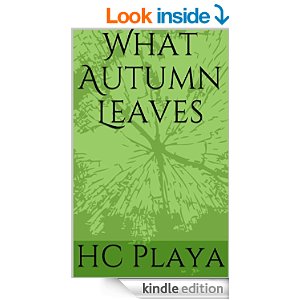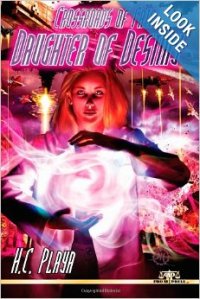This week’s Writer’s Ramble welcomes Ethan Nahte’ to my corner of the interwebs. Today’s discussion will be on the hazards and pitfalls of working with small and micro publishers. For the TLDR version:
- DO YOUR HOMEWORK. Money flows TO the author (maybe in pennies, but still).
- Network. Talk to other authors. If a company has a bad reputation, word gets around.
- Pick up a book by that press. Is it quality work or does it read like a ten year old edited it?
- How many authors does the press publish? Are most of the books by the owner?
- Check with reputable, professional organizations (Writer Beware, Preditors and Editors) to see if there are warnings or if there’s any positive indicators, like awards, and not the kind your kindergarten teacher prints for every kid in the class.
Now, I turn the digital mic over to Ethan:
Bio


Ethan Nahté is an author, journalist, screenwriter, photographer and musician. He has also worked in TV/Film and Radio. He has nearly two-dozen stories and poems published in various anthologies and e-zines. His work spans speculative fiction, historical fiction, comedy, tall tale and young adult. He recently finished his first novel and will be releasing his first collection, Of Monsters & Madmen, which contains eight previously published short stories along with two new stories, complete with art by guest illustrators and introductions for each tale. At least two more short stories are due for publication spring/summer 2016.
When Indie & Small Press Suck
There are times when modern technology makes matters worse instead of better. The low cost of what was once very expensive equipment, programs and such has made it possible for about anyone to have a radio show, make a movie, publish their own book, record their own album and produce thousands of photographs because the cost of film and processing is no longer a factor for most people.
A lot of us in the entertainment field have felt the downside of modernization at one time or another. I work, or have worked, in all the fields mentioned above. Believe me when I say just because you can buy the Eddie Van Halen model guitar doesn’t necessarily mean you can play like Eddie Van Halen. Just because someone doesn’t have to spend a fortune on cameras and editing equipment doesn’t make someone the next Cecil B. DeMille. And with the opportunity to self-publish at the tips of every writer’s fingers, yes, including those whose writing is so terrible that even Stevie Wonder would pick up the book and just say, “Hell, no!”, the indie/small/micro press has possibly hurt the already dwindling numbers of readers.
I’m not going to write about those who choose to self-publish without spending the time or money to hire a proofreader, copy editor, etc. Instead, I want to discuss the pros and cons of the indie/small/micro press houses. Before you stop reading or decide to tie me up with typewriter ribbon and paint my eyes shut with whiteout, let me say that I am talking about a particular portion of these small publishers that are a bane to the industry—both the authors and the readers. I’m going to divide this into three categories.
Category 1- The professionals
I have had some great relationships with some micro and small press houses. I can depend on honest critiques and professional editing from Yard Dog Press (YDP), ProSe Press, 4 Star Stories and Charon Coin Press (CCP), for instance. I know I will receive royalty statements on a timely basis from YDP, CCP and Seventh Star Press. All of them will get me the promised author’s copy of the book I appear in. I’m certain there are other small publishers that fit within this category but these are a handful of the publishers that have published at least one, if not more, of my short stories. As long as they treat me honestly and with respect I will certainly be willing to write for them again. I also realize that they are on tight budgets and that none of them have quit their day jobs so they can sit in the pool at their million dollar mansions. They treat the publishing business as a business, even if their main office is out of their home and they treat the authors properly. This level of quality will generally carry over to the readers who are willing to take a chance on a book from a small press.
Category 2- MOR (Middle of the road publishers that have good intentions, but poor follow through..and you know what they say about good intentions.)
Some publishers I enjoyed working with and might consider doing something once again for them, but it depends on my mood and if they have made any changes. These are publishers who do no marketing, provide no royalty or sales information, and the story selections and editing of their anthologies makes me question if my writing sucks.
Why?
No one wants their work included with stories so badly written it seems as if they are attempting to crawl out of a basement after being mauled by some insidious creature crouching nearby in the darkness. Now, sometimes it is a case of taste or stylistic differences. Maybe the other authors think my story reeks. Regardless, it’s not a book that I will promote heavily at a convention, if at all.
The lack of promotion is one thing that incessantly drives me nuts. When I am in an anthology with one to two-dozen authors, the royalties are squat. I don’t mean this to be a slap in the face to the publishers. It’s just simple math—if a $10 book, which cost $6 to produce, has finally made its money back for the publisher, the profit is then split between one to two-dozen people, the publisher and possibly the artist. Let’s just say 25 people are splitting $4. That comes to 16 cents each. If 100 of those books sell (after making back its production costs) then each author will receive $16, but unless it’s just a really hot book, that amount may be $1.60 for one quarter and 80 cents the next.
Now, if you are the sole author or maybe a co-author of a full novel, yeah, your cut is much higher if you are working with a good publisher and have signed a fair contract. Although, promotion is still very much on the authors in many cases. Some houses do make efforts to attend conventions and expand their readership base, but others do very little of that. People just don’t seemingly read as much, and those that do don’t risk spending $10-$20 on a small press as often as they spend it on a big name author with a big house.
A reputable publisher should deliver on whatever terms were agreed on in the contract, whether that’s a flat fee for a single short story or royalties, or a combination thereof. The MOR publishers vary on the consistency with which they achieve this. You should receive a statement every six months, or at least annually, showing purchased books, especially when you bought copies to sell.
When an author buys copies of the book they are in they are generally paying 30-40% below the retail cost. Even so, that’s a small margin that doesn’t begin to cover buying space at a convention, travel, food, accommodations, website fees (plus time to design and maintain), taxes and swipe fees for cards. Thanks to retailers such as Amazon that make certain they have the lowest price and cut the retail price back down to near cost, it is near impossible to compete and make a profit. Even worse, odds are the book was printed through their Create Space program, so they made money by publishing it themselves then underselling the publisher and me. Not trying to pick on Amazon, but they are the big white whale of self-publishing and retail at the moment.
Category 3- Avoid
In this category go those publishers who put no effort into promoting their authors or books. They don’t go to conventions, notify book sellers, blogs, or anything. They stick a link on a social media site and expect money to just appear. They don’t pay in a timely manner, if ever. No statements ever show up and if you get the promised copy of the book, your eyes bleed from the horrendous editing.
These are the small press companies that are driving reading into the ground.
It is very easy for a company to make a fancy website with lots of hype to lure writers in, filled with promises they don’t uphold. The newer the press, the harder they are to vet, and while I might miss a great opportunity with a new publisher that is going to hit big, after being burned so many times, I advise steering clear of new publishers until they have established a good reputation.
Things to look for include a poorly put together website. Granted, everyone makes mistakes and after hours of coding it is easy to overlook a typo. Anything more than a single typo tells me that if they don’t care enough to proof their own site (or have the ability) then they aren’t going to put out a good book, assuming they ever actually get the book out at all.
If the submission details on a site are extremely vague, unprofessional, or disorganized in the details, I tend to bypass the publisher. If they can’t put together a simple list of requirements for submissions, is follows that they might be disorganized and unprofessional about everything else.
Publishing is a creative business, but it is a business and should be conducted as such.
Authors, do yourself a favor and strive to work with reputable publishers. If you aren’t aiming for a big house, there are still some great indie/small/micro press publishers. Check sites such as Preditors and Editors or Writer Beware. Ask fellow authors about their experience with XYZ Publisher. Check reputable industry outlets and awards for recognition of an editor or publisher. The winner of The Joe Cool First Annual Great Publishing Awards, you know what I mean, is a no.
Readers, do yourself a favor and search for the same thing. If it’s a publisher you aren’t familiar with, at least flip through a book or two, if possible, and look for mistakes or to see if the writing really grabs you. Check the grammar, pacing and sentence structure. Don’t just read the hype on the back cover or the five stars on a review site. If a book averages a high number of stars and has had several reviews/ratings, then it is probably worth a shot. If it has an average of four stars and one person gave it a five and one gave it a three, then it’s a maybe or a no. I can go and give all the books I am in a five star rating and if it’s a new book I can be the first one to rate it and make it look like it averages five stars. Then I can brag on it (if I had no self worth or conscience). Be intelligent in your selections. If you find something promising, give that small publisher or indie author a chance. Who knows, you may end up with a signed first print of the first book of the next Terry Pratchett that you can proudly display on your shelf, and that beats having a shelf full of garbage that you hope you can trade at the used book store to replace your copy of a book you love.
If you’ve liked anything presented here today, show Ethan some love and wander over to one or both of his sites or visit him on Facebook!









